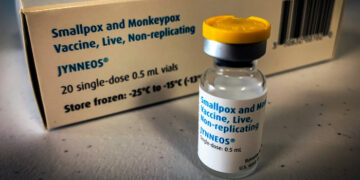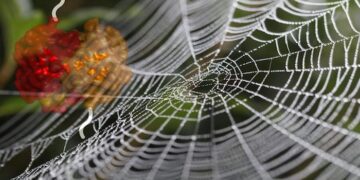A spider silk-based high-tech patch could alleviate the pain of worn-out knees.
Osteoarthritis cartilage is replaced with a man-made graft that is five times stronger than steel and mimics the properties of spider silk.
The silk implant, known as FibroFix, has been shown to encourage the growth of new human cartilage in addition to replacing missing cartilage.
However, other risk factors for osteoarthritis include being overweight, having a family history of the disease, and sports injuries. [Image from a file]
Researchers at Orthox Ltd, the Oxfordshire-based company behind the graft, believe it’s because the protein extracted from silk for the patch (known as fibroin) is very similar to a protein found in human cartilage that aids in its growth.
According to 2014 research published in the journal Knee, sheep tests showed that the silk patch could withstand daily joint impact as well as healthy cartilage.
Many osteoarthritis patients may be spared knee replacement surgery if a preliminary trial involving six patients is a success.
Most cases of osteoarthritis are caused by the natural aging process, but there are other risk factors, such as obesity, a family history of the disease, and sports injuries.
Inflammation and pain result from the breakdown of the joint’s cushioning cartilage, which causes the bones to rub against each other.
Anti-inflammatory painkillers are commonly prescribed to patients, but long-term use can cause stomach damage.
A cortisone flare, where the steroid (cortisone) crystallizes inside the joint and causes more inflammation, can be avoided by steroid injections.
An estimated 100,000 people in the United Kingdom undergo knee replacement surgery each year. After major surgery, a foot-long scar and a year or more of recovery time are not uncommon.
While the silk substitute can be inserted through an incision no longer than 1cm long, the surgery can be completed in less than an hour. On the same day that they have a local anaesthetic, patients can go back home.
Volunteers will be able to do light activities on the affected knee after two weeks of no load-bearing activity before returning to normal.
In order to make the grafts, the protein extracted from silk made by mulberry silk moths is transformed into a fiber with the same complex structure as spider silk. To mass produce the implants, silk moths are used because they produce 1,000 times more silk than spiders.
The National Institute for Health and Care Research has provided the trial with £1.2 million in funding.
For patients who have suffered a small amount of cartilage loss in their knees, such as from a sporting injury, Leeds University‘s Professor Philip Conaghan believes the silk patch could be beneficial.
It may be less useful in joints with more extensive cartilage loss, or damage to other structures, such as the bone beneath the cartilage.’ he added.
According to a recent study published in the American Journal of Lifestyle Medicine, a vegan diet can alleviate arthritis pain by increasing the intake of anti-inflammatory compounds found naturally in plants.
Researchers at Loma Linda University, California, put 44 people with rheumatoid arthritis on a vegan diet for a month and found that joint pain and swelling decreased.





























